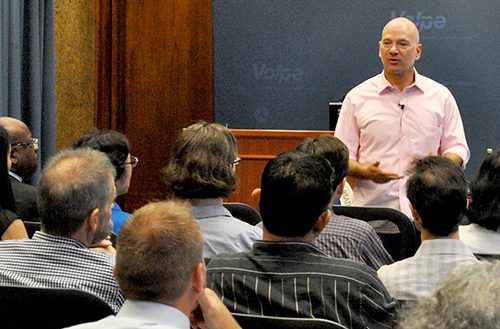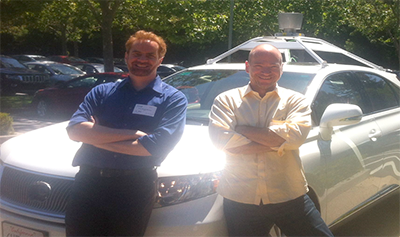Humans and Technology in Transportation: Balancing Augmentation and Automation
Humans: What are they good for?
If you’ve kept up with the tech world over the past decade, you know that computers and machines are much better at some tasks, potentially even complex tasks like driving, than humans are.
But don’t worry: Humans are still good at many things. As assisted-driving and even self-driving vehicles take larger chunks of the transportation market every year, the trick is to strike a balance somewhere on the continuum between augmentation and automation.
 That’s the central theme that Andrew McAfee—co-director of the Massachusetts Institute of Technology’s Initiative on the Digital Economy and co-author of The Second Machine Age—brought as the kickoff speaker for Volpe’s new speaker series Reimagining Transportation.
That’s the central theme that Andrew McAfee—co-director of the Massachusetts Institute of Technology’s Initiative on the Digital Economy and co-author of The Second Machine Age—brought as the kickoff speaker for Volpe’s new speaker series Reimagining Transportation.
Science Fiction and Self-Driving Cars
Those choices will increasingly be made based on technologies that less than a decade ago seemed like science fiction, McAfee said. Take self-driving cars: In the early 2010s, McAfee and The Second Machine Age co-author Erik Brynjolfsson found themselves hurtling down U.S. Route 101 in Northern California in a Google-designed car that was driving itself.
 After a few minutes of abject terror, McAfee settled in and realized the car was a safer driver than most people are. It kept to speed limits and stayed in its lanes. It drove like a driving instructor. But it also missed opportunities to change lanes and make the trip quicker. The car wasn’t making decisions.
After a few minutes of abject terror, McAfee settled in and realized the car was a safer driver than most people are. It kept to speed limits and stayed in its lanes. It drove like a driving instructor. But it also missed opportunities to change lanes and make the trip quicker. The car wasn’t making decisions.
“There is a coming war to assist or replace human decision making,” McAfee said. “This is a war we will see play out not just in the transportation sector. I can’t think of any corner of the economy that is going to be immune from this very deep question: Will technology assist and augment us, or will it take over things we are very used to doing ourselves?”
The answer is clear for McAfee: Machines are much better at complex tasks than we perhaps ever thought they would be. But people still have an edge on common sense and creativity. So far, there isn’t a computer that can think for itself. How we strike that balance between tasks and inspiration will depend on how well we accept our own limitations.
“The problem is we are amazing at a lot of things—but we also have a number of biases and glitches that get in the way of good outcomes and decisions and an accurate view of the world,” McAfee said. “Ignoring those glitches or downplaying them or saying, ‘my constituency is exempt,’ that is how we have bad outcomes in our businesses, on our roads, and in our society.”
Data-Driven Decisions and Avoiding the HiPPOs
So, if we can’t trust ourselves, what can we trust? We can trust decisions based on sound data, because data-driven decisions lead to demonstrably better outcomes, McAfee said. Put another way, trust the geeks, flee the HiPPOs—the highest paid person’s opinions—which tend to favor gut reactions over quantitative analysis.
“As I look around the domains I’m familiar with, I find us way too fond of HiPPOs and relying on what we think of as our human strengths: judgment, intuition, and experience,” McAfee said.
The goal is not to replace humans with machines, or to limit machines from doing what they can do better than humans—it’s about finding the right mix, McAfee said. In transportation, that mix will evolve based on many factors, from personal preference to political will.
Whatever form it takes, McAfee is optimistic that our transportation future will be immeasurably better than our past.
